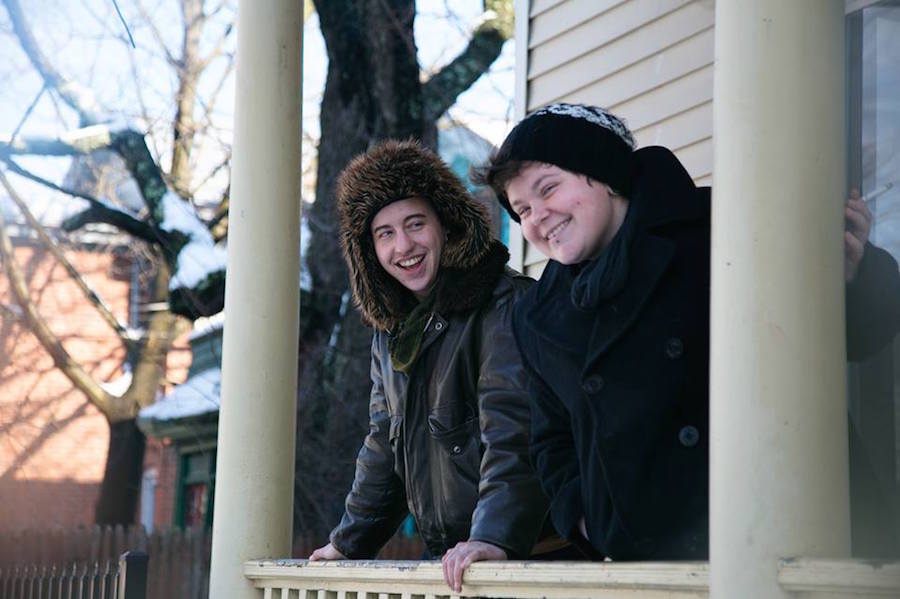
Food & Drink | Arts, Culture & Community | Bonnie Keller

| Seth Wallace and Bonnie Keller. All photos have been contributed by Keller's friends. |
Bonnie Keller loved hard. Sometimes it was for her French bulldog FiFi, who she tucked into the chest of her apron while she was cooking. Other times it was for her motley crew of moped riders, gliding through the streets of New Haven before somebody’s bike inevitably broke, and she made dinner for everyone. Or it was just a friend who asked for eggs benedict, and got a back massage with their hollandaise sauce.
When she lost her life to suicide at the age of 28 last week, New Haven lost a fierce friend and culinary luminary.
Friends and family are gathering this week to remember Keller, at a wake Tuesday at the Mystic Funeral Home and later New Haven gathering on April 27. As they grapple with the news of her death, many have tried to piece together a story of a life that was not always kind to her, in which she gave everything she had.
“We don’t know what happened,” said her friend Cait Smarz on Thursday, in an informal gathering of Keller’s friends in Wooster Square. “It doesn’t make sense to anybody.”
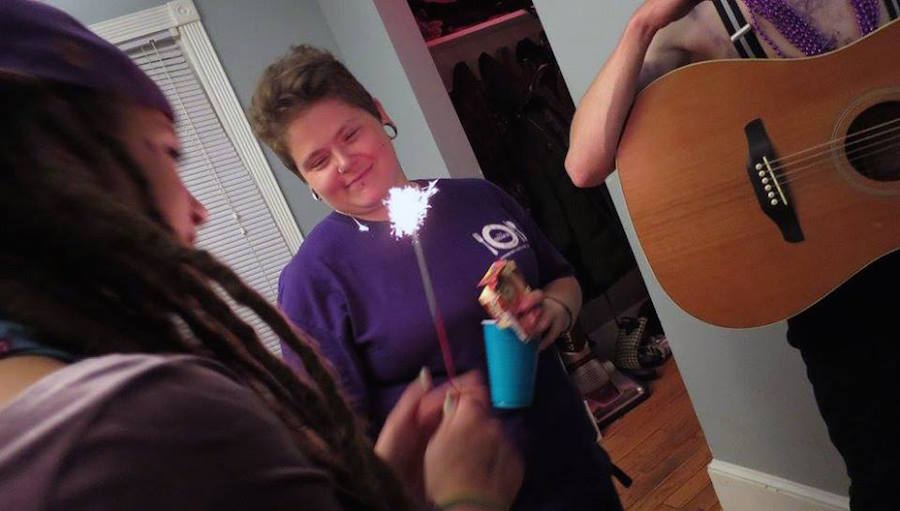
Keller walked a hard road from the moment she entered the world. Born in 1990 to David and Betty Keller, she was raised for the first several years of her life in Groton. Her first love was dogs, fostered at the kennel where her mom worked. It would be years before she had her own, a French Bulldog named Fiona (or more affectionately "Fi" or "FiFi") and a Rottweiler named Lexie. But even then, she was entranced.
“Bonnie literally broke her teeth in on dog biscuits,” laughed her aunt Paula Perkins, who raised Keller for several of her teenage years. “She would eat a raw potato or a dog biscuit before she would eat a candy bar.”
When Keller was five her parents divorced, and she moved with her mom into her grandfather’s home nearby. She developed an early love of food: beef stew from a little outpost called R & R Truckstop; endless plates of chicken and wedge salad from The Chicken Restaurant in Groton. As she started experimenting in the kitchen herself, she found that she had a knack for it, a discovery that would later lead her to jobs at The Shack, Hard Rock Cafe, Margaritas Mexican Restaurant and later The Yolk, Kitchen Zinc and Caseus.
“I’ve wanted to be a chef ever since I was seven years old,” she told New Havener Carissa Duhamel in an interview last year. And long before there were professional kitchens, there was her family’s, with mouths to feed.
Her mother worked multiple jobs, often out of the house. Her dad remarried and had three more children. When Keller was 10, her mom had a second baby named Samuel, born with severe autism. Because she was working multiple jobs, Keller became his part-time caretaker. Much later, her friend and tattoo artist Seth Wallace recalled that she let him try scarification on her leg by asking for a puzzle piece, a prominent symbol of autism awareness.
But the relationship put a strain on Keller. When she was 15, she moved in with Perkins as her mom moved to Tennessee. Her aunt was amazed by this teenager, who harbored a love for big family meals and wacky pajama pants, who would drop what she was doing to do woodworking or painting with her young cousins. She had a knack for the arts, in her element with a paintbrush one moment, and nailing something together in the next. And for food, which never seemed too far out of reach.
“[There was] her love of trying to fill your belly!” said Perkins. “She just wanted you to feel full and wonderful. That was just her goal.”
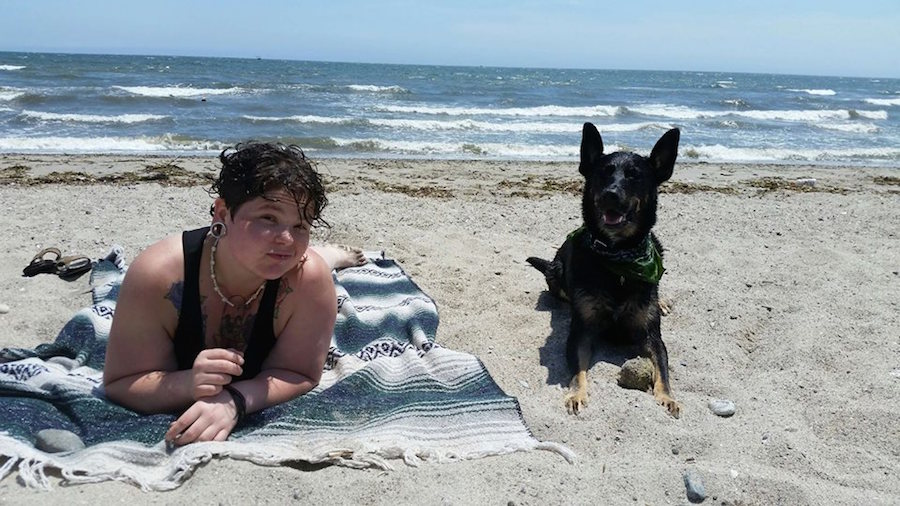
As a freshman at Ella Grasso Technical High School, Keller made friends easily. Rosaly Hernandez, a former classmate and close friend of Keller’s, recalled her as “the glue that bonded all of us together.” After meeting her on the first day of carpentry class, Hernandez said the two became inseparable, two of just three women in an 18-person woodshop, and a small class of 142 students.
“It was impossible to have been in the same room as her and not to be drawn to her,” said Hernandez Friday, reached at home in Miami. “There was this comfort about being around her. You talk to her and it's like you've known her forever.”
What floored Hernandez—and so many of Keller’s friends—was how Keller seemed to live without judgement. Hernandez saw the two as an unlikely pair: Keller liked hoodies and jeans, Hernandez liked dressing up and going dancing. They were "an odd team," and loved that about their friendship.
"That was everything that she was about," Hernandez said. "She broke barriers and the mold. It was never what you expected."
The two remained close after high school. When Hernandez showed up in tears, Keller would ask if she needed to get a body bag or a bottle of wine. When Hernandez became pregnant after high school, Keller bought a Bob Marley onesie and signed up for unofficial auntie duty. When she struggled with an abusive relationship, Keller helped her get out.
And whatever the situation, Keller was always ready with a hot meal that seemed right on time. “Not like, just mac and cheese,” Hernandez recalled of a recent dish she'd eaten, on a visit to New Haven. “She’d make amazing mac and cheese and be like ‘oh, it’s this fermented cheese imported from France.'”
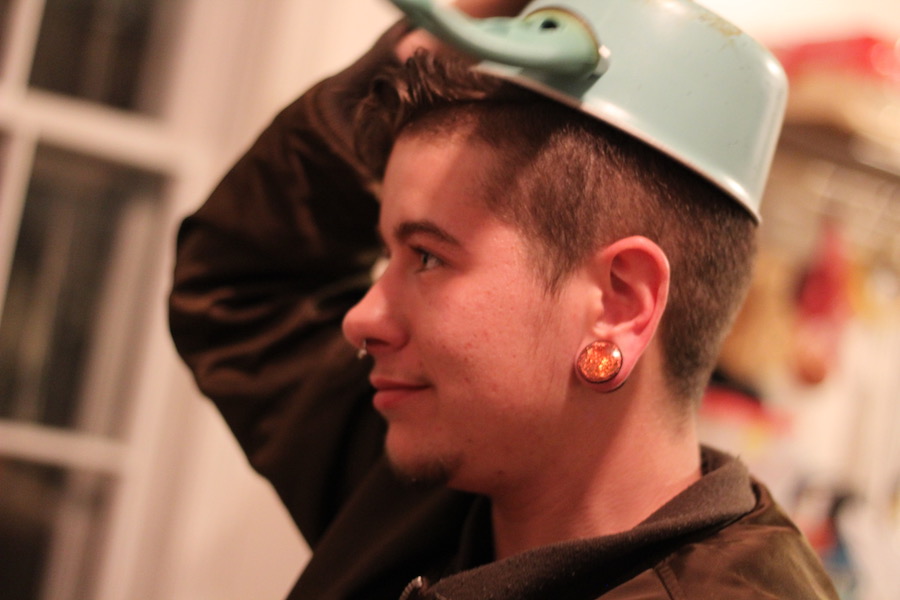
| Mace Hedrick. Lucy Gellman Photo. |
She had that effect on everyone she met, said her friend Mace Hedrick Thursday, at an impromptu gathering at Wallace’s Wooster Square home. You could be in a classroom or a tattoo shop, a buzzing kitchen or the wallflowers-only corner at a party, and Keller would introduce herself like it was the only natural thing to do.
Hedrick met Keller in high school, just minutes after confronting a bully in the hallway reserved for metal shop classes. Only months later, she had moved in part-time with him and his mom. Soon, the two were cooking together, bouncing around jobs in the restaurant industry (“she worked like 60, 70 hour weeks before she was ever 18,” he recalled) and preparing big, at-home breakfasts for his mom on the weekends.
That was a science at Hedrick’s house, where the fridge never had more than a few ingredients at a time. Somehow, they always made it work, turning out plates of perfectly eggy French toast or bacon just as his mother came down the stairs.
“That girl could take a can of Chef Boyardee and make you think that you got it from the finest pasta place in Italy,” he said. “That girl could take anything, anything and put it together … her food would make you nut.”
If there wasn’t a knife or a whisk in her hand, she was giving deep, long hugs and backrubs that he nicknamed the “Bontanamo Bay.” She endeared herself to his mom, sometimes visiting even when he wasn’t home, or when they’d had a fight about something. When she heard the news of her death, Hedrick said, she was crushed.
But those “blinders of her love,” as Hedrick called them, were hard too. When she was 19, Keller married her high school sweetheart, the couple moving to Seattle five years into their marriage. When they got there, Keller found that the two had a number of irreconcilable differences. Keller was broke: she had spent all of her savings flying the two across the country. She asked her friends to help her get back to Connecticut, and moved back in with Perkins.
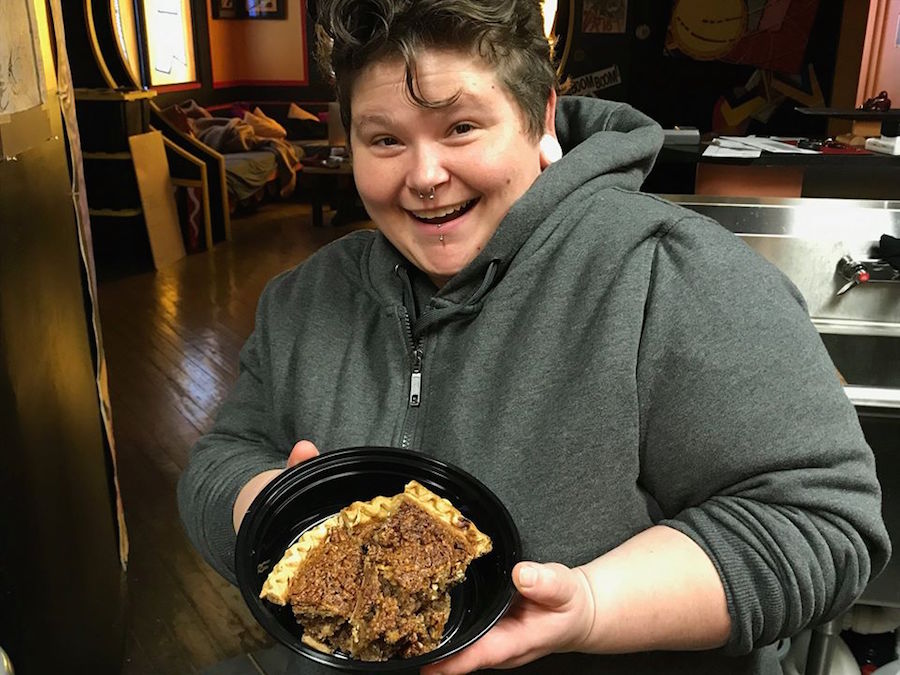
In a 2018 interview with Corey Hudson, she called it one of the most difficult things she ever had to do. She drank heavily for months. She traveled from Perkins’ house to New Haven, moving in with Kawit co-founder and trauma therapist Seth Wallace in January 2015, when he was still living on Williams Street. The day after she had arrived, her mother died of ovarian cancer. She arranged the funeral, moved her brother back from Tennessee, and started looking for a way to make money.
“The world never did Bonnie a fucking favor,” Wallace said Thursday. “And despite that, to be such a giver. We all have a coping mechanism for the hardships in our lives, and hers was giving unconditionally … She made my house into a home.”
“There’s people who go through what Bonnie went through and become hard and terrible people, and just blame the world, and she had every right,” Hedrick added. “But instead, she just gave out this love. This pure love. I don’t think anybody else in the world is capable of giving out that kind of love.”
For a while, it seemed like things were looking up in New Haven. By the end of that first month, Keller had started working at Kitchen Zinc. Reached Saturday by phone, restaurant owner Denise Appel recalled watching her arrive on time for an interview on Jan. 27, 2015—in the midst of a winter storm that pummeled New Haven for two days, and closed the restaurant for at least one of them. By the time it reopened two days later, Keller was working in the kitchen.
“Bonnie was amazing,” Appel said, remembering a self-possessed, sometimes headstrong chef who was always ready with a personal anecdote, and hungry to learn about the world of fine dining after stints in quick-food restaurants and burger joints. “Whoever Bonnie meets, she becomes instant friends with them.”
Her dedication to her work—and to her colleagues—impressed Appel after decades in the restaurant industry. Inside the kitchen, she wasn’t just “a good pair of hands,” but fast friends with the other employees. In summer 2016, she stayed at the restaurant during an August vacation to help Appel paint the mural that still decorates Kitchen Zinc, a pizza-studded landscape where toppings mingle with a few errant Pokémon, scurrying amidst sausage rounds and caramelized onions.
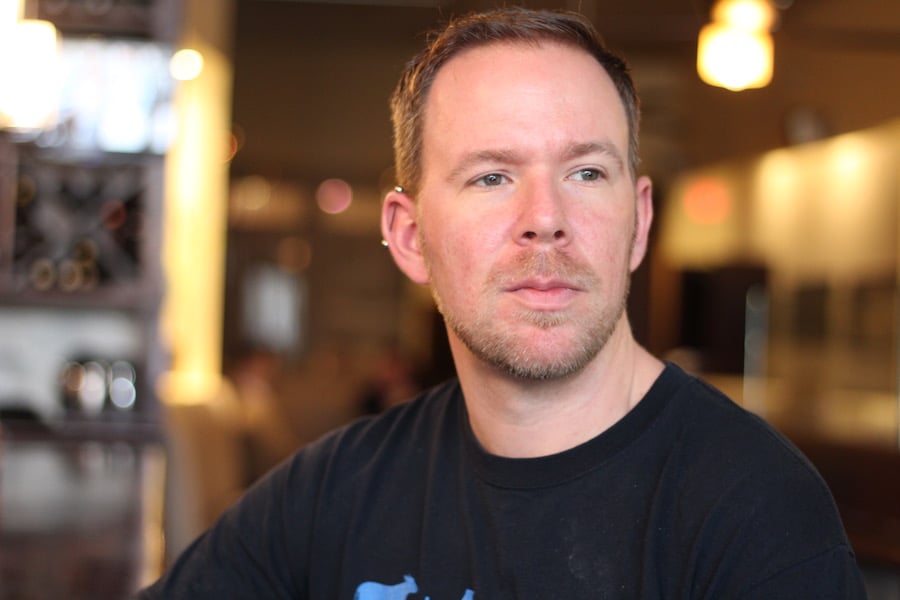
| Blifford on Friday Lucy Gellman Photo. |
“You’d see her, this tiny little girl on this huge ladder, working on it,” recalled Alex Blifford, chef de cuisine at Zinc. Like Appel, he got to know Keller on the job, watching her crack a huge grin and offer a “big, loud hello” when she entered the kitchen each day, or made progress on the mural during mornings she ostensibly had off.
“She was definitely a bright spot, always cool under pressure,” he said Friday. “She wasn’t someone who rattled easily. She wasn’t afraid to get her hands dirty, and she wasn’t afraid to get out there and prove you wrong.”
Her friends saw that spark in her too. By July of 2015, Wallace said it seemed like she could list more New Haveners than he did, and was well-loved by each of them. When they went out to restaurants, she always knew someone—the chef or the bartender, the front-of-house staffer or the person doing social media.
Chef and Kawit co-founder Kevin McGuire (he is also Wallace’s husband) worked with Keller at Foxwoods’ Hard Rock Cafe and then Caseus Fromagerie & Bistro. He said that he was always taken by her presence in the kitchens she called home. To him, Keller walked a rare and unlikely line: calm in the culinary storm, but able to call someone out if she didn’t think she’d been treated fairly. She was tiny and powerful, a dynamo cutting through the space because she belonged there.
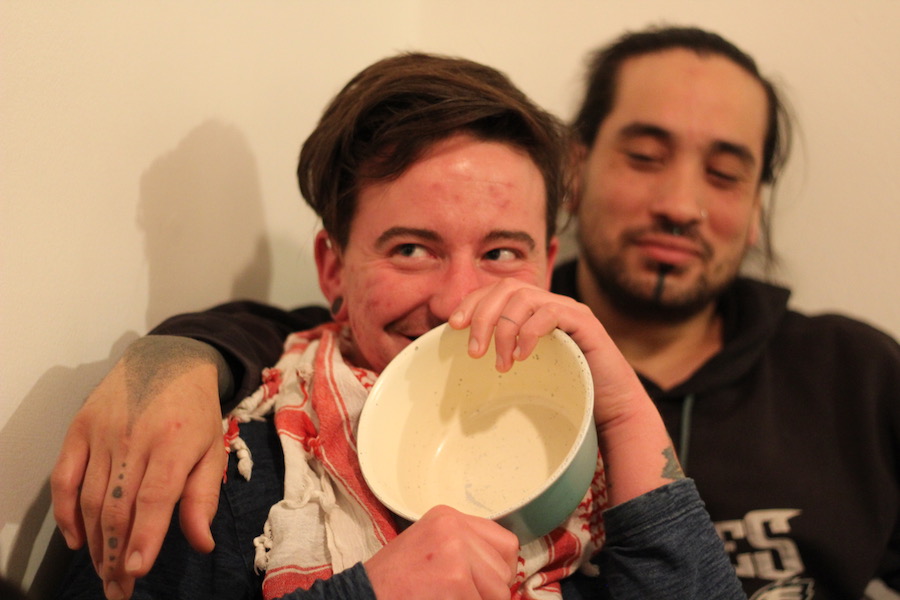
| Wallace and McGuire last Thursday, with a pot that belonged to Keller. She had lent it to the musician Olive Alice after their last Sunday brunch together. |
“Kitchens can be high stress, pumping testosterone and very misogynist,” he said Thursday. “What I see Bonnie do is walk into kitchens as her 5”4’ self with almost an equalizing force. While being gentle and compassionate, I’ve seen her demand respect. Then after airing out that dirty laundry, she’ll be like ‘can I get you some food?’”
In more intimate settings, she had a sort of sixth sense with her friends, checking in on them when something seemed off to her. Food was always the way she showed affection: she cooked for her French bulldog Fiona as often as she cooked for those around her, and always made time to work food into study sessions, impromptu brunches, and parties.
She became close with a group of neighbors in Wooster Square, joining a small moped army that Smarz dubbed the “Dirty Burning Broads,” and lighting up parties on nearby Williams and Lyons Streets. Smarz said the two became instant friends after meeting on Williams Street, where she sold Keller her first moped, spend long days tinkering and cooking with her, and was soon convincing her to get her EMT certification. Robert Roche, a fellow moped rider, recalled summer rides with that ended in big bonfires, where Keller would whip out her skillet and get to work.
“Bonnie would pull out pans and start cooking right over the fire, feeding us literally pan to mouth with a wooden spoon,” said Roche, who met her three years ago at a moped rally in New Haven. “She was smart, really intuitive. She could look at a person and just know what was up.”
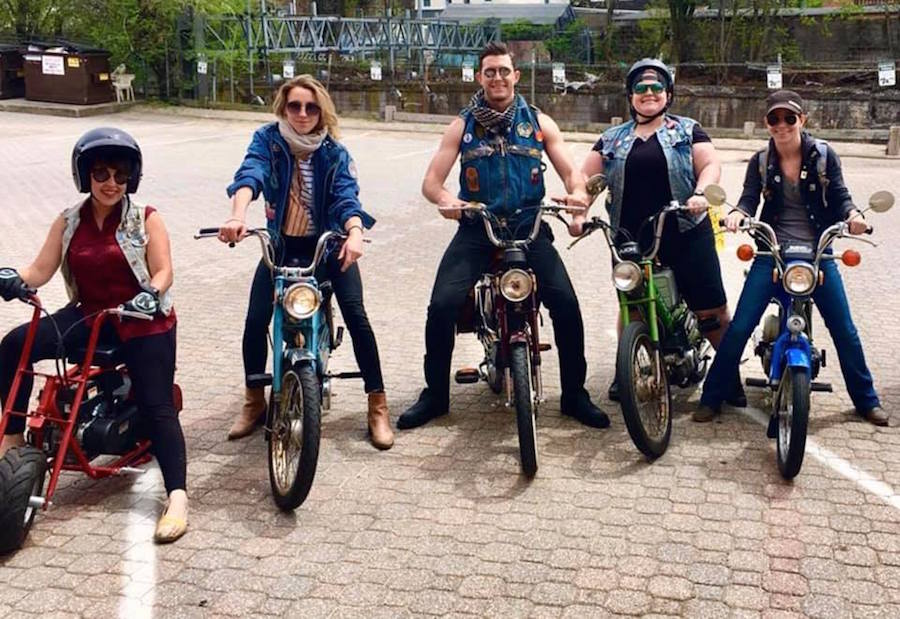
| Some of the Dirty Burning Broads. Interviewed Friday, Roche told a story of Keller taking a spin in a tiny red moped when her own bike was broken. "She looked like an absolute tank on that minibike," he laughed. The last time he saw her, he and Smarz had been fixing up her moped, and Keller had brought them breakfast. He recalled "two plates piled high with the most delicious cheesy egg and vegetable concoction" he had ever eaten. |
Her own cooking career was taking off, too. At get-togethers, Roche recalled a “kind of party trick” where Keller could taste a mouthful of anything—mashed potatoes, mac and cheese—and tease out the ingredients one by one. At home, she had been growing a catering business, making sure she always made an extra meal for an elderly man in her building, or a friend who was working a late shift on their job.
“She knew how to give love, but she didn’t know what receiving what love was like,” said Smarz Thursday. “If I needed to cry, I would cry. If I needed a hug, she would give me the biggest fucking bear hug. If I needed food, she would give me food. If I was damp and cold, she would give me her goddamn shirt off her fucking back.”
“Not the expression,” added Hedrick, furnishing the table with beer as the night sprawled into five, then six, hours of memories. “Like, she literally would take her shirt off and put it on you.”
But she wasn’t as forthcoming about problems in her own life. After arriving in New Haven, Keller fell in love and married for a second time last year. Her friends saw problems in the relationship: she left, went back to, left again. At least once, Wallace said there was a call to the police. Last month, the two started moving towards a divorce, according to people around her. Keller stayed on friends’ couches between stints at home. Wallace said she worried about money, and increasingly about health insurance. That she was looking for a new place to live.
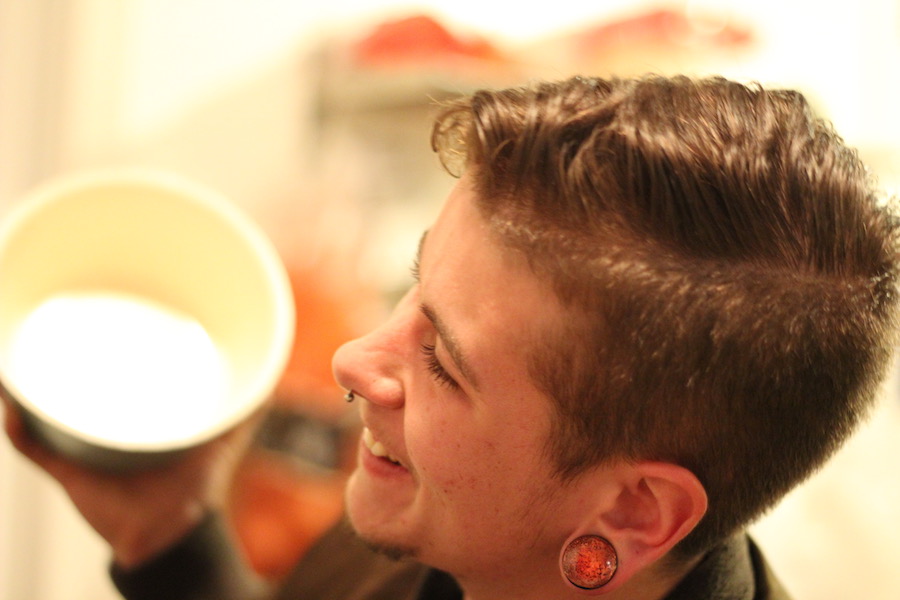
| Hedrick with Keller's pot. “There’s people who go through what Bonnie went through and become hard and terrible people, and just blame the world, and she had every right. But instead, she just gave out this love. This pure love. I don’t think anybody else in the world is capable of giving out that kind of love,” he said. Lucy Gellman Photo. |
“She was trying,” said Jessy Griz Thursday, crowding in around Wallace’s dinner table as friends hugged, cried and shared memories. “It wasn’t that she didn’t know … she was overwhelmed. She was overwhelmed. That’s what she kept saying to me before she died. ‘I’m overwhelmed, I’m overwhelmed. It’s too much.’”
But it was like she didn’t want to impose, Hedrick said. He recalled a recent trip to a bar in New London, where he noticed that Keller wasn’t eating or drinking anything because she was broke, and didn’t want to ask friends to spot her. Only after he'd told her to put it on his tab—"like, how many times did she pay for me when I was 14 and she was working?"—did she get something.
Or a night the week before she died, when she left Wallace’s house because he’d asked for some alone time with his husband. She didn’t come back because she “wouldn’t think to ask,” Wallace said.
Friends reached out. They asked if she was eating and where she was sleeping. They checked in, sometimes several times a day. Musician Olive Alice recalled a day only weeks ago, when the two headed out to Lighthouse Point with a picnic lunch, to yell their frustrations into the water.
“We went down and it was such a beautiful day,” she recalled. “We were both so sad. At that point, she was done with the relationship, but also even at that point, she made comments about wanting to make it work. Even though she was done. Because grief is not a straight line kind of process.”
She had seen Keller one more time after that, for Sunday brunch the first week of April. The two had made Eggs Benedict with two of Keller's pots and a handful of forks in Olive's still-unfurnished kitchen. Then three days later, she was gone.
Now, her friends and family are still trying to come to terms with the reality of a world in which she does not exist—and a world that seemed full of professional promise. The catering business was on a roll. She had just completed her Emergency Medical Technician (EMT) license through Yale-New Haven Hospital, and was applying to jobs in the field.
Friday, her EMT classmate AJ Caggiano recalled her as a ball of energy, always ready with a joke, potential study date or hot meal as they approached their board exams together. For him, friendship with Keller had started as an unspoken sort of code the first day of class, when she sat down next to him. The two both had visible tattoos and gauges in their ears.
“She walked in a room and the room lit up,” he said Friday. “She had a smile that was contagious … even on the roughest days in class, Bonnie would just cut in and say something and make everyone laugh.”
Smarz, who has been training to become a paramedic, said Keller would have been uniquely qualified for the position—surprisingly strong for her petite frame, with a set of crisis management skills that she rarely sees on the job.
“Her and I were going to be fucking Dukes of Hazzard up in that ambulance,” she said Thursday. “Like, she was going to be my EMT partner driving and lifting and I was gonna be in the back as a medic. She would have been so prefect. She would have been phenomenal at that job. She had just gotten her license numbers and she was looking forward to that.”
Reached at home Friday, Perkins said that the funeral will be the hardest thing she’s ever had to do. So did Hernandez, who is taking a flight from Miami for the kind of visit she never wanted to make. When she first heard the news, she said she had to pause because “those words, ‘Bonnie’ and ‘dead,’ don’t go together.”
In a backyard on Williams Street, Roche and Smarz have been working on a commemorative moped, souping up the last one Keller rode. Wallace has already held one large gathering—"I got kicked out of Hebrew school, but I was accused of hosting a shiva,” he said—and is planning another for the end of the month. There will be a bonfire, with someone to keep it going late into the night.
For her closest friends, those make it "doable, for a little while," said Hedrick. "I wanna live as fully and be a chef and a friend, because she would if she was here."
“She was just awesome,” Perkins said. “She was awesome. I can't say goodbye. That's too much to bear. It's ok that she's in New Haven and I'm in Ledyard. But it's not ok that she's not there.”
A wake is scheduled from 6 to 8 p.m. Tues., April 16, at Mystic Funeral Home. Funeral services and burial will be private. Keller’s high school class is raising funds for her service. To donate, click here.

